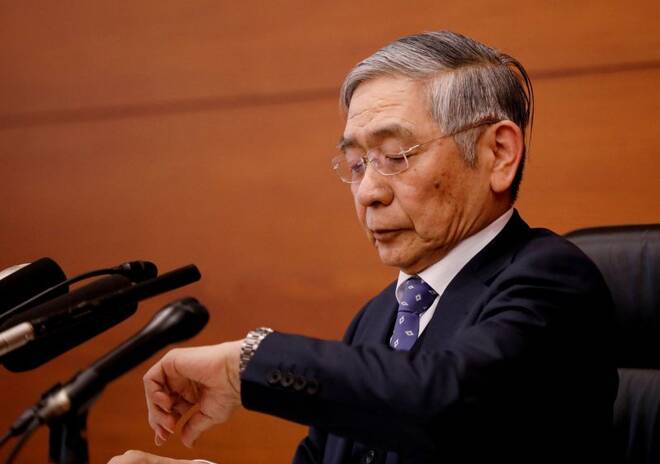Advertisement
Advertisement
BOJ Governor Kuroda’s comments at news conference
By:
(Reuters) - The Bank of Japan shocked markets on Tuesday with a surprise tweak to its bond yield controls that allows long-term interest rates to rise further, a move aimed at easing some of the costs of prolonged monetary stimulus.
(Reuters) – The Bank of Japan shocked markets on Tuesday with a surprise tweak to its bond yield controls that allows long-term interest rates to rise further, a move aimed at easing some of the costs of prolonged monetary stimulus.
But the central bank kept its yield target unchanged and said it will sharply increase bond buying, a sign the move was a fine-tuning of existing ultra-loose monetary policy rather than a withdrawal of stimulus.
Following are excerpts from BOJ Governor Haruhiko Kuroda’s comments at his post-meeting news conference, which was conducted in Japanese, as translated by Reuters:
Reason behind the boj’s decision
“Overseas market volatility has heightened from around spring … While we have kept the 10-year bond yield from exceeding the 0.25% cap, this has caused some distortions in the shape of the yield curve. We, therefore, decided that now was the appropriate timing to correct such distortions and enhance market functions.”
Monetary policy framework
“We are aiming to achieve inflation target stably and sustainably accompanied by wage hikes. That will take some more time. It’s premature to debate specifics on changing the monetary policy framework or an exit from easy policy. When achievement of our target comes into sight, the BOJ’s policy board will hold discussions on an exit strategy and offer communication to markets.”
Focus is on improving market function
“Today’s step is aimed at improving market functions, thereby helping enhance the effect of our monetary easing. It’s therefore not an interest rate hike.
“This change will enhance the sustainability of our monetary policy framework. It’s absolutely not a review that will lead to an abandonment of YCC or an exit.”
Decision won’t diminish the effect of ycc
“Consumer inflation has hit 3.6% mainly through rising import costs from a weak yen. Furthermore, inflation expectations are heightening. This is pushing down real interest rates and enhancing the stimulus effect on the economy. As such, while we’ve (widened the band) to correct distortions in the yield curve, the move won’t diminish the effect of YCC.”
Consumer inflation
“Consumer inflation is expected to slow and likely will fall short of 2% as a whole in the fiscal year 2023. As such, I don’t think we need to review YCC or quantitative easing for the time being.”
Wage growth
“We are aiming to achieve a positive economic cycle in which inflation picks up moderately accompanied by rising corporate profit and wages. While the outcome of spring wage negotiations are important, we won’t look just at single data but the broader economic mechanism behind the moves in making policy decisions.”
Risks to growth and inflation
“We’re seeing more momentum in wage growth and inflation. But inflation is expected to slow next fiscal year compared with this year, so we’re still not likely to see a situation where our inflation target could be stably and sustainably met accompanied by wage hikes.
“But there are both upside and downside risks to growth and inflation. It’s important to closely monitor developments and respond as appropriate. For now, I don’t expect conditions to fall in place for the BOJ to immediately review the YCC or our massive monetary easing programme.”
On the widening of the yield band
“It’s absolutely not aimed at tightening monetary policy.
“The 10-year JGB yield has risen to around 0.4% but we’re not sure whether this will continue. We plan to ramp up government bond purchases and offer to buy unlimited amount of bonds, not just for the 10-year but that of other maturities. I believe that through these steps, we can forestall any negative impact on the economy.”
SHOULD 2013 GOVT-BOJ JOINT STATEMENT BE REVISED?
“By taking necessary steps based on the statement, Japan’s economy has steadily recovered and not in deflation. At present, I don’t see the need to tweak the statement.”
(Reporting by Leika Kihara; Editing by Sherry Jacob-Phillips)
About the Author
Reuterscontributor
Reuters, the news and media division of Thomson Reuters, is the world’s largest international multimedia news provider reaching more than one billion people every day. Reuters provides trusted business, financial, national, and international news to professionals via Thomson Reuters desktops, the world's media organizations, and directly to consumers at Reuters.com and via Reuters TV. Learn more about Thomson Reuters products:
Advertisement
